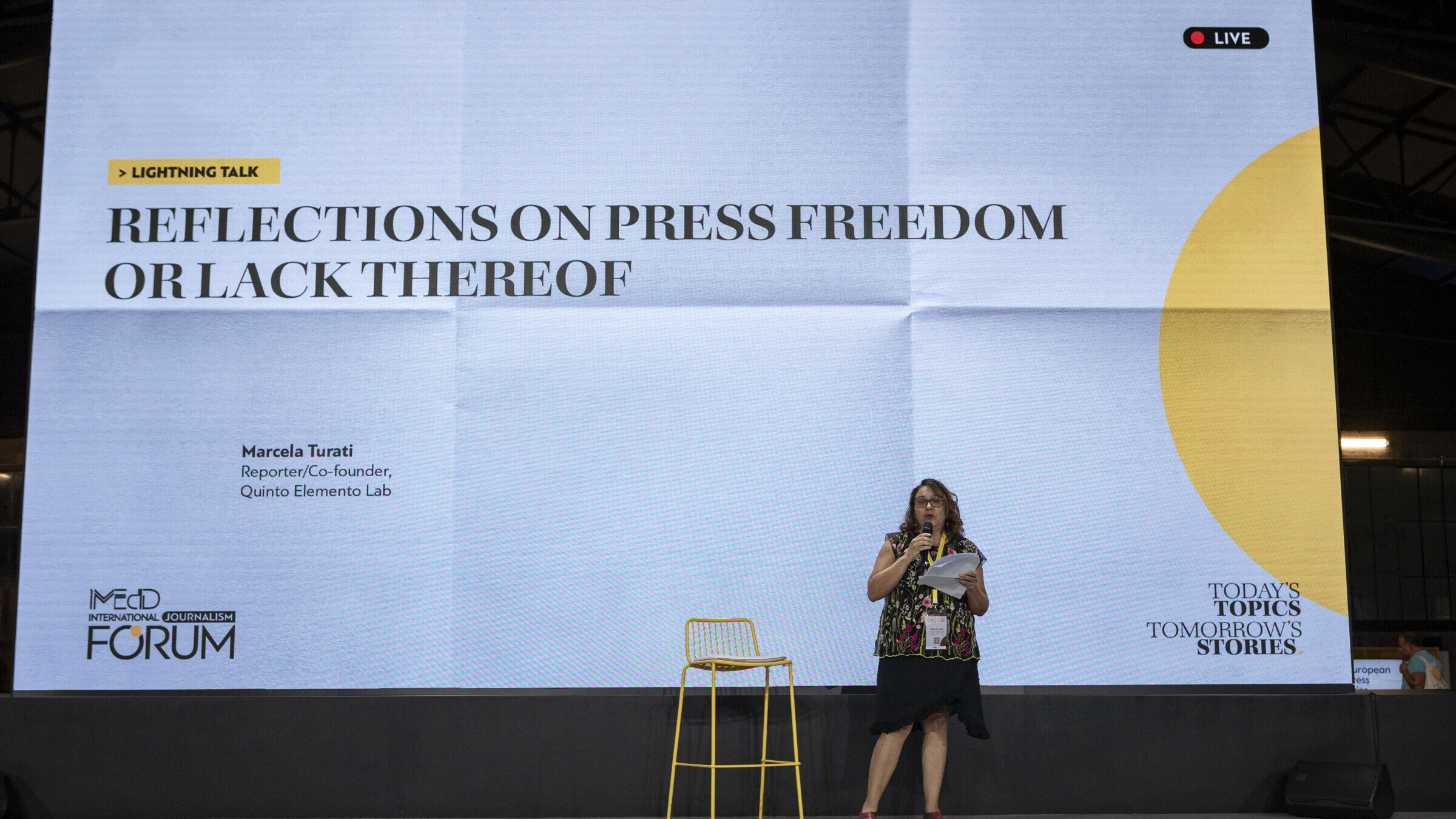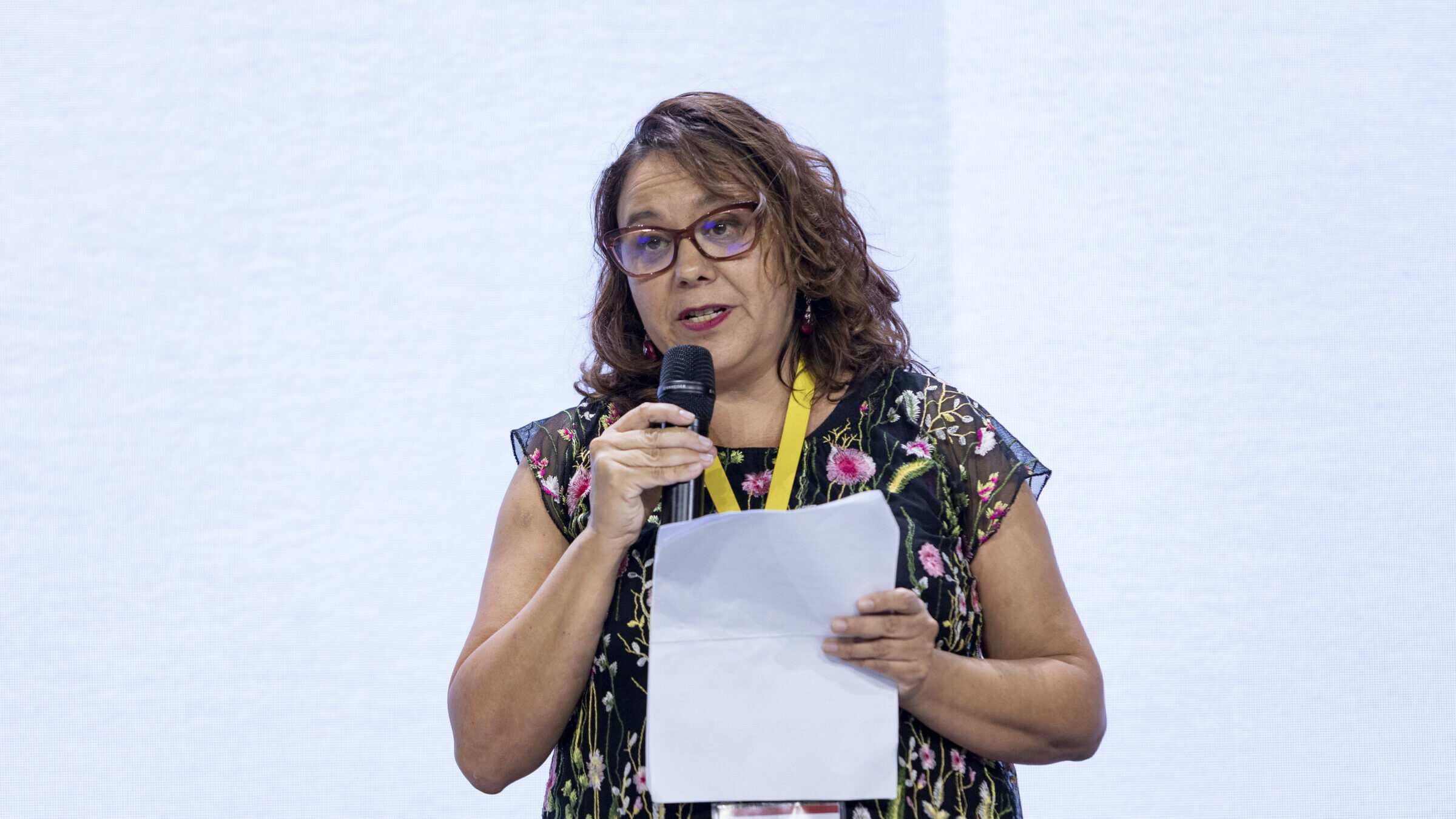Through an interview with investigative journalist and co-founder of the Quinto Elemento Lab, Marcela Turati, iMEdD digs deeper into the phenomenon of disappearances in Mexico, the inadequate state apparatus and what journalists can do moving forward.
The Shadowy World of Telegram Hooligans

The Bad Blue Boys, hooligans associated with Croatian club Dinamo Zagreb, have links to organized fans from Ukraine and Greece. An in-depth investigation conducted by iMEdD delved into numerous public channels and social media profiles to uncover the connections between organized fans from Croatia, Ukraine, and Greece, as well as their affiliations with far-right ideologies.
“Since the War on Drugs was declared in Mexico in 2006, more than 150 journalists have been murdered and more than 30 disappeared. Mexican journalists do not die in crossfires or from land mines like in a traditional war. In Mexico, journalists are being hunted” said Marcela Turati, in the Lighting Talk series “Reflections on press freedom or lack thereof”. As a conclusion to the second day of the iMEdD International Journalism Forum, the session exposed the many faces of human rights abuses and violation of press freedom around the world.
During the interview, Turati started by setting out the context of the humanitarian crisis that Mexico is facing, with 112,000 people having disappeared in total and a staggering average of one person disappearing each hour in the last years. More than 55,000 unidentified bodies have also been found in morgues and mass graves, giving way to the question of how this became Mexico’s norm?
Back in 2006, when President Felipe Calderón declared the War on Drugs, namely a full-scale military offensive against drug cartels, the country became an epicenter of violence. The government’s punitive policies pushed drug cartels toward a territorial power struggle. Coasts, borders, ports; anything was disputed to secure vital transportation routes for drugs and weapons but to also traffic women and children. According to Turati, “this is a huge business”, and cartels need to consolidate control. Not only does this mean enforcedly recruiting young people to work as their drug mules, manual laborers, and sex slaves but most importantly wiping anyone that can pose a threat to them out of existence.
Although the War on Drugs has been an important turning point, organized crime has not been the only responsible force shaping the trajectory of disappearances in Mexico. For Turati, government corruption and impunity play a major role; “you never jail perpetrators, so there is an ‘invitation’ to do it again and again”. Indeed, only 2 to 6% of disappearances have led to prosecutions and only 36 convictions have taken place on a national scale.

The undeclared war on Women in Europe: The data analysis methodology

The story reports on the issue of femicides and violence against women in 28 European countries from 2010 to 2021.
Over her 12 years of investigative expertise, Turati has witnessed public servants within the Federal Prosecutor’s Office, politicians, and law enforcement officers entangled in unholy alliances with organized crime. “Maybe they are not part of the killings, but they are involved because they didn’t investigate, lost the bodies, had them incinerated”, she sighed. The pervasive corruption within Mexico’s institutional framework, seamlessly intertwines with the deeply entrenched machista culture that dominates the cartel hotspots. In cities like Ciudad Juarez, on the border with El Paso, in the US, gender-based violence and discrimination have become embedded in social life, tracing back to the horrifying killings of young working women during the 1990s. According to the 2022 “Diagnóstico de mujeres desaparecidas” (“Diagnostic tool for disappeared women”) report, more than 2,000 cases are being reported annually since 2020. Although the new General Law on Disappearances might be responsible for the increased filing of cases, the report showed that the rise in disappearances has coincided with the country-wide expansion of the Jalisco New Generation and Sinaloa cartels since 2018.
However, journalists have also paid the price of the War on Drugs. Since 2006, professionals that have covered drug-related crimes or authority corruption, have been faced with “Censorship by bullet” policies. Between 2006 and 2010, more than 30 media workers were murdered or disappeared. As a response to this violation of press freedom and human rights, Turati pledged to help journalists cover violence through the exchange of research and reporting techniques as well as protect the journalists in risk. Periodistas de a Pie, an organization initially co-founded by Turati to support journalists cover poverty issues, changed its course in 2008, to take up Turati’s mission. Nevertheless, violence is still a harsh reality given that in the beginning of 2022 alone, 8 journalists were killed. Throughout all these years, Turati has not given up. In 2016, she co-founded Quinto Elemento Lab, an independent journalism collective that supports journalists in their investigations in an effort to fight corruption in Mexico and uphold a human-rights-centric narrative. On the “A dónde van los desaparecidos (“Where for the disappeared go”) website, Quinto Elemento Lab publishes stories related to disappearances on a weekly basis, with one of its most important pieces being an interactive map of Mexico’s 2,000 illegal mass graves filtered by municipality, state and year. Turati’s goal is for her work to be “part of a Commission of Truth in real time. Maybe the information we are gathering is not making sense now, but we can put together the puzzle and help a family recover their children in the future. There is a purpose”.
In her relentless pursuit of truth, Turati’s investigative journey has been marked by challenges and danger. In 2010, she delved into the gruesome aftermath of the San Fernando Massacre, where 72 migrants met a brutal fate. The following year, she investigated 47 mass graves, revealing the horrifying remains of nearly 200 victims, all victims of the ruthless Zetas drug cartel, aided by corrupt municipal police. A few years later, Turati discovered that she was being surveilled under the government’s Pegasus project, and that she was also filed as a criminal suspect in the dossier of the very massacres that she was trying to expose. “On the one hand, I felt relief because I always noticed strange things in my cell phone, my computer, the Wi-Fi in my house” she confessed. “But at the same time, I felt frustrated because now it’s so difficult for me to contact people inside the government because they feel that if they speak with me, somebody will listen”.

We are part of a Commission of Truth in real time. Maybe the information we are gathering is not making sense now, but we can put together the puzzle and help a family recover their children in the future. There is a purpose.
Marcela Turati, Investigative Journalist and Co-founder of the Quinto Elemento Lab
24 years, seven tragedies

24 years, seven tragedies: The survivors’ experiences and the collective trauma of an entire nation.
However, the pursuit of truth, by unraveling other people’s tragedies, becomes an arduous endeavor. When questioned about the delicate balance between her role as a journalist and the roles of a therapist or law enforcer when communicating with the families of the disappeared, Turati reflected on her approach. “You have to focus on being the best reporter, not the best solver of their lives’ problems. Maybe we feel that we are indispensable, the only ones who can understand them. This is not the case and it’s difficult. But we have to be really honest, no tricking or cheating or creating false expectations”, she admitted. She concluded that journalists can still be humane or empathetic without having to completely “turn off” their journalistic instincts or their methodology.
In her forward-looking perspective, Turati voices deep concern regarding the laws and mechanisms around the phenomenon of disappearances. Despite promises made by the López Obrador administration to tackle the forensic crisis head-on, it was only this May that a National Forensic Data Bank was announced. This comprehensive tool envisioned to encompass a national registry of mass graves, a national database of missing persons, and a genetic database for DNA comparisons between missing individuals and recovered bodies. However, these components, essential on their own, remain incomplete or virtually non-existent. The failure to fully implement a robust and unified forensic system has spanned three administrations, leaving a void of effectiveness and accountability. With elections scheduled in June 2024, there is increasing skepticism about whether the next government will finally resolve the forensic crisis. “We have many institutions and different laws, but they never match; laws that cannot be enforced by the Prosecutor’s Office and cancel themselves out. It’s time lost”, said Turati.
The failure to fully implement a robust and unified forensic system has spanned three administrations, leaving a void of effectiveness and accountability. With elections scheduled in June 2024, there is increasing skepticism about whether the next government will finally resolve the forensic crisis.
For Turati, the driving force behind structural change in Mexico are primarily the families of the disappeared. “They are always creating ways to put the situation on the international stage. For me, they are the hope; they are the heroes and heroines. I feel blessed and honored to cover them because they are a force of love, that I am really amazed by” Turati exclaimed. Before we parted, she stressed once more the importance of being in a collaborative journalist network: “We are exploring new ways to work collectively as well as monitor our feelings and well-being. The idea of going to mass graves is terrible and you end up broken inside, but we know this won’t stop tomorrow. It will be generational and long-term, and we need to learn how to do better”.
Watch the full panel discussion here:
